- Home
- James S. A. Corey
Strange Dogs (Expanse) Page 4
Strange Dogs (Expanse) Read online
Page 4
Services were held in the same space as school, only with the tables taken out and benches made from local wood analogs hauled into rows for people to sit on. Who gave the sermon varied week by week. Most times, it was someone from the original science teams, but a couple of times one of the soldiers’ ministers had taken a turn. It didn’t really matter to Cara. Apart from the timbre of their voices, the speeches all sounded pretty much the same. Mostly she let her mind wander and watched the backs of the heads of all the people in front of her. The people from town and the soldiers who’d come to the surface all sitting together but apart, like words in a sentence with the spaces between them.
It wasn’t the same for the kids. Xan and little Santiago Singh played together all the time. Maggie Crowther was widely rumored to have kissed Muhammed Serengay. It wasn’t that the kids didn’t recognize the division so much as that it didn’t matter to them. The more soldiers came down the well, the more normal it was to have them there. If that worried her parents, it was only because they were used to it being a different way. For Cara and Xan and all the others in their cohort, it had always been like this. It was their normal.
After the sermon, they trickled out into the street. Some families left immediately, but others stood around in little clumps, talking the way the adults did after church.
The results of the new xenobotany run looked promising and The soldiers are breaking ground on a new barracks and Daffyd Keller’s house needs repair again, and he’s thinking of taking the soldiers up on their offer of new accommodations in town. Speculation on the water-purification project and the weather cycles data and the platforms or stick moons or whatever people wanted to call them. And always the question—sometimes spoken, but often not—Have you heard anything from Earth? The answer to that was always no, but people asked anyway. Church was all about rituals. Standing with the sunlight pressing against her face trying not to be impatient was as much a part of the day as the sermon.
After what seemed like hours and hadn’t been more than half of one, Xan and Santiago ran off with a pack of the other children. Stephen DeCaamp finished his conversation with her parents and wandered off toward his own home. The church crowd scattered, and Cara got to follow her parents back to their house. The road was flat, but the prospect of going back to the pond, of seeing the dogs again, made it feel like she was walking downhill.
“More,” her mother said when they were out of earshot of the others. Her tone of voice told Cara it was part of a conversation that was already in progress. One she hadn’t been part of. Her father’s sigh confirmed that.
“We knew that would happen,” he said. “You can’t expect them to live in orbit forever. Being in a gravity well will be good for them.”
“Not sure what it will be for us.”
Her father shrugged and glanced toward Cara, not to include her but to postpone the conversation until she wasn’t around. Her mother smiled thinly, but she let it drop. “Why don’t you ever go play with the other children?” she asked instead.
“I do when I want to,” Cara said.
“Must be nice,” her mother replied with a chuckle, but didn’t go farther than that.
As soon as they were home, Cara changed out of her good clothes, grabbed a lunch of toasted grains and dried fruit, and ran out the back. She took a jacket, but not because she’d get cold. She figured that if the dogs brought the drone back, she’d be able to wrap it up and sneak it back into the house that way. Then she could put it in her mother’s case later, when no one was watching. A drone had to be easier to fix than a sunbird, after all.
At the pond, Momma bird was sitting at the edge of the water, unmoving and wax-skinned. The tiny, angry black eyes focused on nothing in particular. The babies hissed and spat and chased each other around the pond, diving sometimes, or flapped their pale leathery wings. Cara sat a little way off and ate, watching them. The dogs might not come back today. They might never come back. Maybe they ate drones. Or maybe sunbirds rose from the dead on their own. That was the thing about Laconia: with so much that no one knew, anything was possible.
After a while, she folded the jacket into a pillow, got out her handheld, and read part of a book about a lost boy looking for his family in the overwhelming press of people in the North American Shared Interest Zone. She tried to imagine what it would be like, walking down a single street with a thousand other people on it. It seemed like it was probably an exaggeration.
The afternoon heat drew a line of sweat down her back. A chittering flock of four-legged insectlike things roiled through the sky like a funnel cloud before diving onto the water, covering the pond in a layer of shining blue-and-green brighter than gemstones for five or six minutes before rising again at the same instant and shooting away into the trees. Cara hadn’t seen them before. She wondered if they were a migrant species, or something local that hadn’t crossed her path before. Or maybe this was the kind of thing she was supposed to tell Instructor Hannu about.
That seemed weird, though. What was there to say except I saw something I haven’t seen before? As if that wasn’t always true. It would be a strange day when that didn’t happen.
She did feel a little guilty not saying anything about the dogs, though. Something that took dead animals and made them not-dead would be the sort of thing the soldiers wanted to know about. Would want to capture and study. She wondered if the dogs would want to be captured and studied. She thought not, and they’d already done more for her than the soldiers ever had.
The sun slid westward. The fronds of the trees clattered in the breeze like someone dropping a handful of sticks forever. The anticipation and excitement of the morning mellowed and soured with every hour that the dogs didn’t come back. The shadows all lost their edges as thin, high clouds caught the sunlight and softened it. A flash of red and yellow from the stick moons faded and flared and faded again. Artifacts of whatever long-dead species had built the gates.
She watched the lights flutter and stream like a kite caught in some different, gentle wind. Or a bioluminescent creature like they had on Earth. Something alive, only not alive. Like Momma bird. She wondered if maybe the stick moons were like that too. Something in between. And maybe the dogs…
Something moved in the darkness under the trees, and she sat up. The dogs came out, ambling toward her gracefully on their oddly jointed legs. Cara scrambled to her feet, stepping toward the dogs that weren’t dogs. Or if they were, they were what Laconia meant by the word.
The big, apologetic eyes fixed on her, and she grabbed her own hands. She didn’t know why, but she felt like she should wave or bow or do something to show them that she was glad they were there.
“Hi,” she said. “I didn’t think you’d come.”
The dogs came around her, making a semicircle with her at the center. The drone hung from the mouth of one at the back, vortex thrusters powered down and clicking against each other like fingernails.
“Were you able…?” Cara said. Then, “Did you fix it?”
The dog with the drone came forward, lifting its head toward her. She took the drone, and the dog let it go. It was her mother’s drone, there was no question about that. And the section she’d shattered was intact, but it looked different. The shards and splinters of its carapace were there, but a lattice of silver-white made a tracework where the breaks had been. Like a scar that marked a healed wound. There was no way her mother would fail to notice that. But it wouldn’t matter, as long as it worked. She put the drone down on the clover, slaved it to her handheld. The thrusters hummed. The drone rose into the air, solid and balanced as ever. Cara felt the grin in her cheeks.
“This is perfect,” she said. “This is everything. Thank you so much.”
The dogs looked embarrassed. She powered down the drone and wrapped it carefully in her jacket as they turned and walked back into the dimness under the trees. She wondered where they went when they weren’t at the pond. If there was some cave they slept in or a pod where they c
urled up at night. She had a hard time picturing that. And it wasn’t as if they had real mouths to eat with. Maybe they all went to some kind of alien power jack and filled up whatever they used as batteries.
“Thank you,” she shouted again into the shadows. She stood, holding the drone to her chest like it was a baby. “If there’s anything I can do for you…”
She didn’t finish the sentence.
She walked back home quickly, her steps quickened by the prospect of being home, of sneaking the drone into her room unseen. She’d have to be clever to get it back into its case without her parents knowing she’d taken it. There were two ways into the house—the front that faced the road to town, and the back by the garden and the shed. The question was which would be most likely to get her past her family’s watchful eyes and safely into her room. It was getting close to dinnertime, so the front would probably be best, since at least one of them would be in the kitchen. Or she could stow the drone in the shed under the cart and wait until everyone was asleep. That probably made more sense…
She knew something was wrong the moment she stepped in the back door. The air felt different, like the moment before a storm. Soft voices she didn’t recognize came from the living room. She walked toward them with a sense of entering a nightmare.
Her father was sitting on a chair; his face had literally turned gray. A uniformed soldier stood beside him, head bowed, and Santiago Singh was behind them, looking away. The boy’s eyes were puffy and red from crying. No one turned to her. It was like she was invisible.
Her mother walked in from the front door, footsteps hard and percussive. Her mouth was tight and her eyes as hard as rage. She gazed toward Cara without seeming to see her.
“Mom?” Cara said, and her voice seemed to come from a long way away. “What’s wrong?”
* * *
It was one of those things. An accident. If any of a thousand details had been just a little different, no one would have even noticed it. The soldier who’d been driving the transport had indulged in a couple beers with his lunch, so his reaction times were just that much delayed. Xan and Santiago and the other boys had decided to play football instead of tag, so there was a ball that could take a wild kick. Xan had been nearest the road, so he’d been the one to run out to retrieve it. The whole thing was over before anyone understood it had begun. Like that, her little brother was dead, and the drone and Momma bird and the dogs didn’t seem important anymore.
Cara sat while the soldier explained it all. Santiago Singh stood at attention, weeping as he retold all he’d seen like the good little soldier he was. Her father lurched out of the room at some point. Her mother dropped her favorite serving bowl, the fragments scattering across the floor. They were like moments out of a dream, connected because they were about the same thing, more or less. But she couldn’t have said which happened first. Which one led to the others. Xan was dead, and it shattered time for her. It broke everything.
Admiral Duarte sent his condolences. This was a lapse of discipline that should never have happened. The admiral had already ordered the drunk soldier’s execution. Cara’s family would be put first on the list for a place in the new housing facilities, and Cara would be guaranteed a place in the academy when it opened. The admiral understood that nothing could compensate for their loss, but the soldiers would do what they could. With the family’s permission, the admiral would like to attend the wake. Someone had said, Of course, but Cara didn’t know if it had been her mother or her father. She might even have said it herself.
The town didn’t have a mortuary. In the years they’d been on Laconia, there hadn’t been more than a handful of deaths, and none of them had been a child. Not until now. No one seemed to know what to do or how to go about it. Cara had never been to a funeral before. She didn’t know what to expect.
They brought Xan home that afternoon, and his body had already been cleaned. Someone had found or made a burial gown for him, white cloth from his throat down to his bare feet. They put him in the front between the door and road on a table. His eyes were closed, his hands folded on his belly. Cara stood at his side, looking down at him and trying to feel. Everything in her seemed to have gone numb.
To her, Xan looked like he was sleeping. Then he looked like he wasn’t really Xan, but only a statue of him. A piece of art. Cara found she could flip her brain between seeing him one way and then the other, like he’d become an optical illusion. Her brother, but only asleep. Something not alive, but also not her brother. Back again. Anything except the two together: Never both Xan and dead.
People from town came. Edmund Otero. Janet Li. The Stover family, with Julianne Stover carrying her new baby on one hip. They brought food. A couple of times, they tried singing hymns, but the songs died out before they could really take root. At one point, Mari Tennanbaum seemed to well up out of the crowd and grab Cara in an awkward hug, like Cara was supposed to be comforting her instead of the other way around. Then Mari faded back into the swirl of bodies and hushed conversation. Cara went back to looking at her brother’s corpse.
There was something. Not a bruise really, but where a bruise would have been if Xan’s blood hadn’t stopped where it was. A discoloration on his head. Cara couldn’t get the idea out of her mind that this was where Death had touched him.
She didn’t see the soldiers arrive so much as hear it. A change in the voices around her. When she thought to look up, Admiral Duarte was there, silhouetted by the light spilling out of their doorway as he talked to her parents. It was the first time she’d seen him in person and he wasn’t as tall as she expected. A centimeter or two shorter than her father. His uniform was perfectly tailored. His pockmarked cheeks made him look older than he probably was.
He was talking to her parents when she saw him, his head bent forward like he was putting all his attention into listening to them. It was a little bit like having a Greek god or a character out of history show up. It wasn’t the only unreal thing about the evening, but it was one among others.
Her mother said something she couldn’t hear, and the admiral nodded and touched her arm as he replied. He shook her father’s hand, neither man smiling. When he walked in her direction, she thought it was to see Xan. To view the body, if that was the phrase. She was surprised when he stopped in front of her.
“Cara?” The way her name sat in his mouth, it was like he was making sure he had the right person and also talking to someone that was his equal. His eyes were soft brown. She could see the sorrow in them. “My name is Winston.”
“I know,” she said like she was accepting an apology. Letting him off the hook.
He shifted to look at Xan. They were silent for a few seconds. He sighed. “I wish I could make this better. I’ve lost people I love before. It was very hard.”
“Why?” she asked, and her voice was sharper than she’d expected. It wasn’t a fair thing to ask. She wasn’t ever sure quite what she meant by it other than who the hell was he to come to her brother’s funeral and talk about his own pain. Winston took the question in, pursing his lips like he was sucking on it. Tasting it.
“Because I hate feeling powerless,” he said. “I hate being reminded that the universe is so much bigger than I am. And that I can’t always protect people.” He shifted to look at her directly again. Like he actually cared about her reaction to this explanation. She understood why the soldiers would follow him. Why they all loved him.
“Would you undo it,” she asked, “if you could? If you could bring him back?”
Maybe he heard something in the question. Maybe it was only that he was listening to her so deeply. He paused, thought. “I believe that I would, yes. I need your family to be well. To be part of what I’m doing here.”
“Taking over Laconia?”
“And everything that comes after that. I want to keep people safe. Not just here but everywhere. The people on Laconia, not just the ones who came with me but all of us, are my best chance to do that. And yes, if I could save your
brother, I would. For him, and for your parents, and for you. If I could wave a magic wand and go back in time to keep him off that road? I would do it.”
“You killed the soldier who killed him. Didn’t you need him too?”
“Not as much as I needed you and your family to know that your brother mattered to me. I’m the government here. I imposed that. I didn’t ask your permission first. That puts some obligations on me. It means I have to show sincerity and respect for our rules, even when that requires doing something I might not want to do. I don’t have the right to compromise.”
“I think I understand that.”
“We have to be one people,” he said. He sounded sad. “There’s no room for tribes on Laconia. That’s how they do it back in Sol system. Earth and Mars and the Belt. That’s what we’re here to outgrow.”
“Everything is different here,” Cara said, and the admiral nodded as though she’d understood him perfectly, then touched her shoulder and walked away.
Behind her, someone was weeping softly. She didn’t turn to see who. For the first time since she’d come home, she felt almost clearheaded. When she put her hand on Xan’s foot the same way she used to when she woke him up, his body was cold.
“It’s going to be okay,” she said. “I know how to fix this.”
Her parents were in the kitchen with Mari Tennanbaum, each of them with a squat glass of wine. Usually her father would be making jokes about it being vintage fifteen minutes ago, but now he didn’t seem to notice it was in his hand. The missing joke made her sad, because it meant he was sad.
“What happens to him tonight?” Cara asked.
Mari blinked and reared back a centimeter as if Cara had shouted something rude. Her father didn’t react at all, just turned the fixed, polite smile a degree more toward her. Her mother was the one to answer.

 Leviathan Wakes
Leviathan Wakes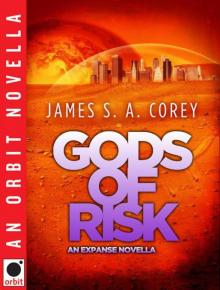 Gods of Risk
Gods of Risk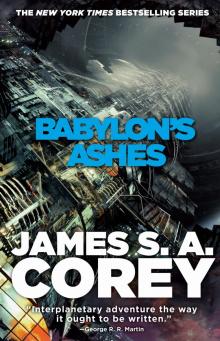 Babylon's Ashes
Babylon's Ashes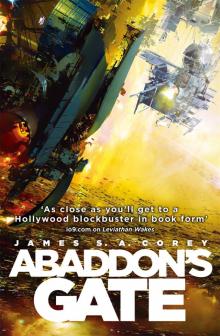 Expanse 03 - Abaddon’s Gate
Expanse 03 - Abaddon’s Gate Tiamat's Wrath
Tiamat's Wrath Persepolis Rising
Persepolis Rising The Butcher of Anderson Station
The Butcher of Anderson Station The Churn
The Churn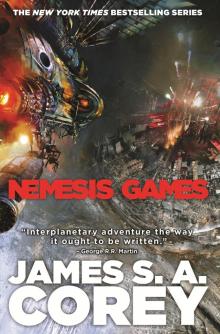 Expanse 05 - Nemesis Games
Expanse 05 - Nemesis Games Strange Dogs
Strange Dogs Honor Among Thieves: Star Wars
Honor Among Thieves: Star Wars Cibola Burn
Cibola Burn Caliban's War
Caliban's War The Vital Abyss
The Vital Abyss Auberon
Auberon Persepolis Rising (The Expanse)
Persepolis Rising (The Expanse) Caliban's War: Book Two of the Expanse series
Caliban's War: Book Two of the Expanse series Leviathan Wakes: Book One of The Expanse
Leviathan Wakes: Book One of The Expanse Cibola Burn (Expanse)
Cibola Burn (Expanse) Strange Dogs (Expanse)
Strange Dogs (Expanse) The Vital Abyss: An Expanse Novella (The Expanse)
The Vital Abyss: An Expanse Novella (The Expanse) Leviathan Wakes e-1
Leviathan Wakes e-1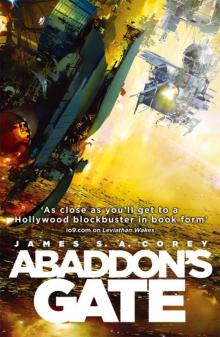 Abaddon's Gate e-3
Abaddon's Gate e-3 Caliban;s war e-2
Caliban;s war e-2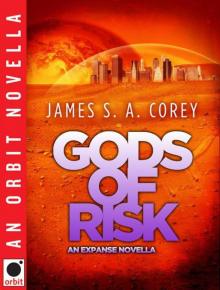 Gods of Risk: An Expanse Novella
Gods of Risk: An Expanse Novella Honor Among Thieves: Star Wars (Empire and Rebellion)
Honor Among Thieves: Star Wars (Empire and Rebellion)